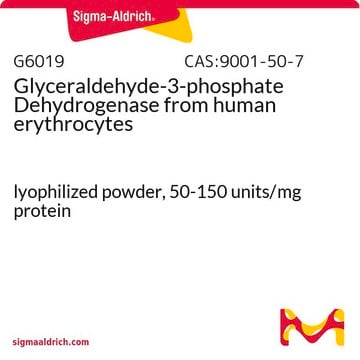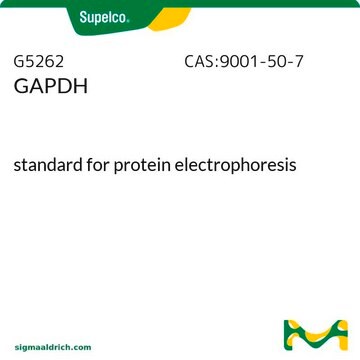SRE0024
Glyceraldehyde-3-phosphate dehydrogenase human
recombinant, expressed in Escherichia coli
Synonym(s):
D-Glyceraldehyde-3-phosphate: NAD+ oxidoreductase (phosphorylating), GAPDH, Triosephosphate dehydrogenase
Sign Into View Organizational & Contract Pricing
All Photos(1)
About This Item
Enzyme Commission number:
1.2.1.12
UNSPSC Code:
12352204
NACRES:
NA.54
Recommended Products
recombinant
expressed in E. coli
Quality Level
specific activity
≥80 units/mg protein
storage temp.
−20°C
Related Categories
General description
Glyceraldehyde-3-phosphate dehydrogenase (GAPDH) localizes to the cytoplasm but can be translocated to the nucleus depending on cellular conditions. It is a tetramer containing identical chains. The gene encoding GAPDH is localized on human chromosome 12p13.
Application
Human glyceraldehyde-3-phosphate dehydrogenase has been used as a positive control for hydrogen sulfide treatment to detect sulfhydration of protein targets.
Biochem/physiol Actions
Glyceraldehyde-3-phosphate dehydrogenase (GAPDH) catalyzes the reversible oxidative phosphorylation of glyceraldehyde-phosphate, which is a critical energy-yielding step in carbohydrate metabolism. It binds to several proteins including actin, tubulin, amyloid precursor, polyglutamine peptides, DRPLA (dentatorubral-pallidoluysian atrophy) and huntingtin. Phosphorylated GAPDH associates with cytoskeletal elements and controls microtubule dynamics in the early secretory pathway. GAPDH is also a component of the functional GAIT (interferon-?-activated inhibitor of translation) mRNP (messenger ribonucleoprotein). GAPDH expression is dysregulated during melanoma progression.
Unit Definition
One unit will reduce 1.0 μmole of 3-phosphoglycerate to D-glyceraldehyde 3-phosphate per minute in a coupled system with 3-phosphoglyceric phosphokinase (3-PGK) at pH 7.6 at 25 °C
Physical form
This product is recombinant, human GAPDH expressed in E. coli with an N-terminal histidine tag and has a predicted molecular mass of 37,984 Da. The product is lyophilized from a buffered solution with stabilizers.
Other Notes
Alternative number: CAS Number 9001-50-7
Signal Word
Warning
Hazard Statements
Precautionary Statements
Hazard Classifications
Eye Irrit. 2
Storage Class Code
11 - Combustible Solids
WGK
WGK 3
Flash Point(F)
Not applicable
Flash Point(C)
Not applicable
Certificates of Analysis (COA)
Search for Certificates of Analysis (COA) by entering the products Lot/Batch Number. Lot and Batch Numbers can be found on a product’s label following the words ‘Lot’ or ‘Batch’.
Already Own This Product?
Find documentation for the products that you have recently purchased in the Document Library.
Customers Also Viewed
Gennaro Napolitano et al.
EMBO molecular medicine, 7(2), 158-174 (2015-01-15)
Metabolite accumulation in lysosomal storage disorders (LSDs) results in impaired cell function and multi-systemic disease. Although substrate reduction and lysosomal overload-decreasing therapies can ameliorate disease progression, the significance of lysosomal overload-independent mechanisms in the development of cellular dysfunction is unknown
Noncanonical function of glutamyl-prolyl-tRNA synthetase: gene-specific silencing of translation.
Sampath P, et al.
Cell, 119(2), 195-208 (2004)
Deregulation of glyceraldehyde-3-phosphate dehydrogenase expression during tumor progression of human cutaneous melanoma.
Ramos D, et al.
Anticancer Research, 35(1), 439-444 (2015)
Hydrogen sulfide inhibits Kir2 and Kir3 channels by decreasing sensitivity to the phospholipid PIP2.
Ha J, et al.
The Journal of Biological Chemistry, RA117-RA117 (2018)
Glyceraldehyde-3-phosphate dehydrogenase is phosphorylated by protein kinase Ciota /lambda and plays a role in microtubule dynamics in the early secretory pathway.
Tisdale E J.
The Journal of Biological Chemistry, 277(5), 3334-3341 (2002)
Our team of scientists has experience in all areas of research including Life Science, Material Science, Chemical Synthesis, Chromatography, Analytical and many others.
Contact Technical Service









